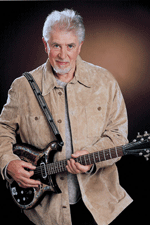> [Archived] Interviews

John Mayall in Bucharest
He was as dynamic and brilliant in concert, as delicate and moderate during the conversation I had the joy of carrying on with him; totally distinguished and purely British, John Mayall had this to say about the blues:
'This music is so good because it tells universally valid stories, about which people feel that they match their own life stories; it talks about the human condition, and when you play about such a theme the listeners will say, more than in any other cases, "I've done this too, I've been through this myself". It's about the emotional connection that the blues creates'.
Does this apply only to the lyrics or to the music as well?
The two cannot be separated because they tell the story together. You can, of course, write poetry or the lyrics for a song, but they will never have as much strength as when you connect them to the music. It's true that music has the power to stir emotions by itself, but when you mix the music and the words something really unique is born.
It is known that the blues is the music of African-Americans in the southern United States. There are even opinions that say it has influences from traditional British music. What is your view on this issue?
I wouldn't say that there are any such influences to be found in the blues; I think that the blues is the music of the African-Americans and that it has been part of their history since the beginning of the slavery period. We don't know nowadays exactly how it used to sound back then, or when the blues actually started being played, because there weren't any recording devices that could be used to make a record of it. We can, however, listen to what was recorded in the '20s, and those ethnographic recordings clearly show that the blues had been around for a long time. Thus I believe it's the music of African-Americans, born out of oppression and slavery; that was the starting point from which it developed - I can't really find any European music influences in it.
How do you see the course of the blues from the Delta genre to what is being played nowadays?
The blues, the rock and roll - they have so much diversity - once born and disseminated all across America, the blues has known many styles, because every state, every city came with their own characteristic sound. But because the blues is so complex you can't really separate the genres, since 'the explosion' of this music occurred everywhere. And the jazz and the blues had been extraordinarily popular in Europe long before they were played on a wide scale in America, actually!
I think that blues and classical music share this essential quality - complexity. Do you find any similarities between the two genres?
I believe they are connected by emotion. But the variety and the improvisation that individualise the blues and the jazz are not really found in classical music. Spontaneity, making music out of nothing, then and there, are what define both blues and jazz.
Do you have to know your band mates very well to be able to pull off these impressive improvisational moments, which, in fact, we have been listening to?
Yes, of course, because the way of thinking the music has to be in-tune, so to say. Sometimes one second of music is sufficient, it's enough to hear only a few notes and you start improvising from there; that is the spark. We follow each other's melodic lines and music is born - it's about a special link that you don't find very often. I feel lucky to have this relation with my band mates.
When one of your songs, Medicine Man, was playing people were silent here, in Bucharest. They were silent and they were listening to this fabulous music. Why do they say that the album that had this song, Blues from Laurel Canyon, was the turning point of your career?
It was totally out of the ordinary, unusual. The orchestration was different, there was no percussion. It was an experiment that I think worked, because this style has then been used in jazz songs - but it's true that you can create rhythm with and out of anything, not just drums.
Can you give us a definition of the blues, or of music?
Not really! Because music speaks for itself, it's a phenomenon in itself and it transmits everything it needs right from the moment it reaches your ears.
Translated by Marcela Zorland and Valentin Tepes-Paleu
MTTLC, Bucharest University














